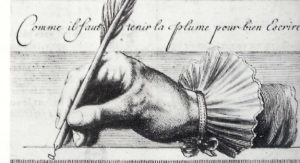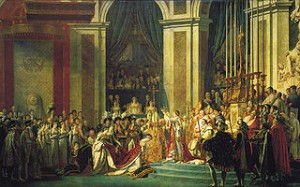by Sandra Gulland | Apr 5, 2011 | Adventures of a Writing Life |

There is nothing quite so wonderful for an author as a serious reader. Here’s part of an email:
Dear Sandra,
I just reread Mistress of the Sun a couple of months ago, and I came away surprised at how much dialogue there is, all of it excellent, and wondering why I missed this the first time. (I was probably just wrapped up in the story.) It makes me reflect upon different writers’ approaches to narrative.
Edith Wharton always filled her books with so much description — description of rooms, curtains, spreads of food, not to mention description of the characters’ emotions. I tend to think of Mistress of the Sun as being more like Hemingway: Not everything is made explicit by the author’s voice, and we’re invited to interpret meaning by closely observing what the characters are saying — or not saying — to one another. (This is ironic, of course, considering that your aristocratic subject matter is closer to Wharton’s.)
Maybe I’m reading a bit too much into this, and maybe you’re approaching the Next Novel in a different fashion. But that’s what I’ve come away with.
Description is all-important, but very hard work, especially for historical fiction. My editors constantly push for more detail, and I’m glad they do.
I do tend toward what I like to think of as Gothic Minimalism. (I fancied I’d founded a School with those words, but no.) I try to be spare, and I like to see a lot of white on the page: this is where dialogue comes in. Plus, it’s wonderful when characters start talking.
I often wish I could be more witty—I’m the person in the group who just doesn’t get the joke—but basically I just comb a manuscript over and over again, cutting out dead wood with each pass, trying to be true. I look for what Butler so aptly calls thrum—that lively movement from one sentence to the next, one scene to the next.
“So no, Jordan, I don’t believe my approach will change,” she said. “At least with respect to dialogue,” she added, thinking of the three people reading the third draft of The Next Novel, and wondering what they were thinking—knowing that there would have to be more descriptive detail. Perhaps I should reread Edith Wharton, she thought.
by Sandra Gulland | Mar 20, 2011 | Adventures of a Writing Life |

I get the most wonderful mail. Here’s one:
I hope this email finds you well. My name is Kristin and just this past week, I have just finished reading your Josephine B. trilogy. I read all three books within a week and wanted to let you know of the impact your writing has made on me.
You see, I am planning a celebratory trip to Paris this fall with my mother. Paris has always been a city that has intrigued me, mostly for the tragic and romantic notions that surround it. Over the past several months, I have been conducting research on the places that we would like to visit. It is very easy to become overwhelmed, due to the city’s rich history that contains so much allure, stories, and sights. I honestly didn’t know where to begin. Once I did begin, I became lost very quickly in choices, guidebooks, travel websites, reviews, etc.
A friend, after hearing of my travel plans, recommended your books. The timing could not have been more perfect. As I was reading your books, I found myself keeping my laptop right by my side. I have probably used Google and Wikipedia more in the past week than I have in the past year. Without realizing it, I have given myself a “mini-education” on various aspects of the French Revolution and of course, Josephine and Napoleon. My next order of business is to read as much as possible on that time period, using many of your recommendations (from your website).
Our trip in the fall now has a better sense of purpose, as we will plan to visit many of the sites from the novels. I am particularly drawn to Malmaison, and hope to spend some time there during our visit. I plan on giving the first book in the series to my mother this weekend, I’m sure she will be just as charmed as I was.
I just wanted to express my thanks for your wonderful work. I am very much looking forward to buying your other books. I should probably save one for the airplane ride but I know that the temptation to read it right away will be too great!
Kristin and her mother will be celebrating two milestone birthdays together: she will be turning 30, and her mother 60. I can’t imagine a lovelier celebration.
Be sure to try to see David’s The Coronation of Napoleon in the Louvre, Kristin: the room it’s in is not open for viewing every day, so you have to find out when to go. It’s well worth it. I wept when I last saw it.
Enjoy Malmaison! And thank you so much for writing.
Readers: what places have you traveled to after reading about it in a book?



